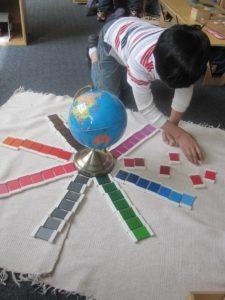 With all the varied childcare and education options available for your family, narrowing in on the right philosophy and method for your child can be difficult. Every school and facility is a little different, including ones that practice Montessori methods, and when it comes to what is best for your little one, all of the options can begin to seem overwhelming.
With all the varied childcare and education options available for your family, narrowing in on the right philosophy and method for your child can be difficult. Every school and facility is a little different, including ones that practice Montessori methods, and when it comes to what is best for your little one, all of the options can begin to seem overwhelming.
Though the Montessori method has gained popularity for its accessibility and inclusivity, parents who have begun the search for the ideal care facility or school for their child may wonder if this method is right for their family. Discover important things to consider about Montessori schools before you make the decision for your child.
1. Learning Style
Parents of children who may be considered late bloomers or who experience learning difficulties often look for alternative education options to give their child a better chance at success than they may have in a traditional schooling environment. Because the Montessori method places emphasis on holistic, child-led education, many parents consider it the best possible choice for their child.
The Montessori method supports children in forming a positive relationship with learning, regardless of physical, emotional, or environmental obstacles that may make it more of a challenge for some than others. Children in Montessori are often encouraged to move at their own pace and to continue to explore subjects from multiple angles until they find one that works for them.
Montessori children receive a great deal of support but also much freedom to learn and explore. The environment can accommodate all learning styles but is especially advantageous for children who would thrive in an environment with a great deal of structure with the educational format but less structure with the ways that each child spends their time.
2. Temperament
Montessori schools are excellent at facilitating a healthy imagination, independence, a strong sense of self-confidence, and deep respect for the world around them. These schools are ideal at helping children to flourish in ways they already succeed, but they may also challenge children to grow in new ways, too. In fact, many shy children in Montessori schools often begin to come out of their shells after enough time in the environment.
Families interested in Montessori schools should consider their child’s disposition before enrolling him or her in a program, as the format is ideal for those who want a holistic, child-led environment that allows children to explore independently and develop relevant, practical skills with teacher guidance over instruction.
3. Family Philosophy
The Montessori philosophy emphasizes cooperation over competition between students, as well as the importance of nurturing a child’s emotional and social development alongside his or her academic development. Families who tend to agree with these tenets, as well as the belief that children are capable and competent when mastering skills independently, would do well in a Montessori environment.
Montessori schools are especially ideal for families who want a less conventional approach to learning and skill mastery that they can also incorporate at home. The structure of the Montessori method incorporates principles that, when also integrated at home, reinforce a child’s unique talents even outside of the classroom, and can even strengthen family relationships through learned cooperation.
The Montessori method is ideal for families who are open to a variety of learning styles, prioritize the cultivation of curiosity, and believe children have numerous ways to be successful in school and in life as a whole.
If you and your Minnesota family are ready to learn more about the Montessori method, contact Miniapple International Montessori School to schedule a tour and discover the ways this popular schooling philosophy is right for you and your child.

